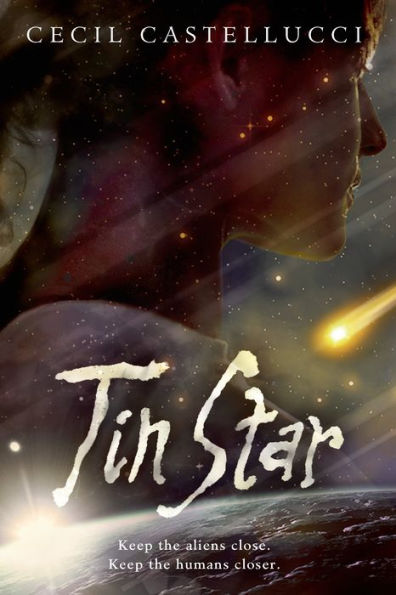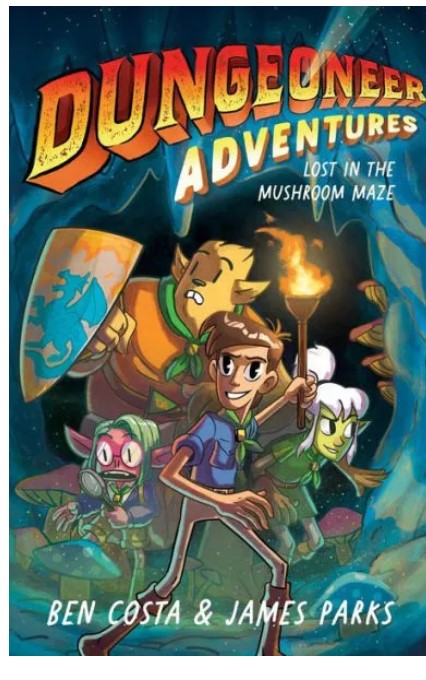Left for dead at a space station far from Earth, Tula is focused on getting revenge. Revenge for the beating Brother Blue gave her. Revenge for the death of her family and the other members of the group who had hoped to colonize a planet. In order to get revenge, Tula must first learn to survive in the underguts of the space station.
Luckily, an alien named Heckleck befriends Tula. Heckleck teaches her how to trade with the natives and gives her a desperately needed friend. Just when life on the space station began to seem normal, three humans crash land on the station, and Tula wants to use this opportunity to get her revenge. She soon discovers that taking down Brother Blue may mean the end of Earth. Should she take this opportunity to destroy her greatest enemy or protect the planet that she loves?
Tula and Heckleck are loveable characters that show that friendships can grow despite physical differences. Even though Tula trades with questionable people, she has an honorable code of ethics that she lives by. This code allows other characters to trust and respect her.
Because the story is written from Tula’s point of view, the reader has the opportunity to feel her pain, understand her desire for revenge, as well as see her desire to do what is right. The author uses vivid description to bring Tula to life and make the reader care for her.
Although the book has some violence and sexual content, these scenes are not described in detail, and they are in the book to advance the plot, not merely to add to the entertainment factor of the book.
Overall Tin Star is an entertaining book that gives readers a glimpse into a believable space world, where different species learn to care for each other despite the harshness of life.
Sexual Content
- At the space station, two people can fight in a hotch. This is a way to settle disagreements. Tula is forced to fight one of the humans in a hocht. During the hocht, Tula thinks, “I had never been this close to a man . . . his mouth was near my ear, his breath hot. He had some stubble on his cheek. His skin was warmed. His smell filled me . . . I wanted to both pull away and also pull in closer but my eyes kept going over to Reza, who was watching from the side. I stumbled backward. Wishing that I was doing this dance with him.”
- When Tula is talking to an Earth boy, she describes, “His lips were just inches away from mine. I was on fire. As Reza spoke, I could feel his breath on my face, and I opened my lips hoping to catch his words in my mouth.” Later in the same scene, Tula thinks, “Every part of me reached for him. I ran my hands through his hair. He smelled kind. I had no words for pain, for despair, for loneliness. I put my lips on his. Our hands found each others’ skin. My body trembled. I had to stop before I exploded . . . I had gone hungry at times during my time here, but truly I had been ravenous for touch. I knew that I would not be able to survive without it anymore. It was nourishing, intoxicating, and addictive.”
- When a female Earth girl is trying to manipulate Tula, the girl uses physical touch. “She put her hands on my shoulders. She kissed me. It was a warm kiss. Full of affection and softness. But it was so different from Reza . . . She kissed me again. The kiss was electric, but had no warmth to it. No love. She was trying to manipulate me, and to get what I wanted I would have to go with it . . . After a while we stopped kissing. I held her in my arms the way that I held Reza, but it was far from the same.”
Violence
- Brother Blue punches Tula in the face. “He hit me again, and now I was too stunned to scream. He did not stop until I was limp . . . It was only when he thought that I was dead that he moved away from me. . .”
- Heckleck, a bug-like alien, uses his tongue that, “looked like a sharp pointy bard” to injected Tula with nanites, which gave her the ability to understand Universal Galactic as well as breathe the air on the space station. After Heckleck injects her, she feels ill and wonders if he was, “calmly waiting to finish me off at his leisure, picking off parts of me when needed.” She then goes on to think, “Maybe this insect-like alien had done me a kindness. After all, I had just thought about killing myself and had been too cowardly to do it.”
- Heckleck gives Tula a cloth that contained a digit from someone’s crew member. Tula is instructed to, “tell him to give you the item, or I’ll send the rest of the crew member to him in pieces.” He then threatens to kill Tula if she betrays him.
- Tula thinks back to her childhood fights. “There was hair pulling with my friend over a doll we both wanted. There was a slap and a push I gave to my sister, Bitty, when we were fighting. There was a kick to the groin I’d given a boy at school who had tried to paw me at a party. Then I turned my thoughts to the fights I’d witnessed. My father, drunk over the holidays, fists in front of him, always jabbing at my equally drunk uncle, face covered with his arms but his stomach getting pummeled. I remembered the bully from school, Mika, fighting the scrawny Stan: Mika moving quick from side to side while Stan crouched low, always hitting Mika’s spleen. And of course Brother Blue, standing over me and kicking in my ribs.”
- Tula and an Earth boy fight in a hotch. They push and hit each other, and at one point Tula, “brought my knee up to his groin.” In the end, Caleb allows Tula to beat him.
Drugs and Alcohol
- Kitsch Rutsok’s bar is a popular hangout place on the space station.
Language
- None
Supernatural
- None
Spiritual Content
- While discussing the dead, Heckleck said, “But the dead, they have ghosts. Ghosts are very useful for haunting. Never forget the dead, Tula. They have their function. They sometimes speak at the most useful or inopportune times.”
- Tula likes to go to the Gej temple. The Gej were a highly spiritual race who are no longer at the space station. When Tula had an item that she did not know how to trade she would, “bring it to one of the shrines and place it as an offering. I liked making offerings to gods I did not know. It seemed somehow more pure. Did the Gej have one god or many? Were they even gods at all? I wasn’t certain. But when I put a cracked gem down or a burned a sole stick of incense, it called me as if I was wishing on fallen and forgotten stars. Perhaps I’d given a gift to a deity who cared only for love. Perhaps I’d placed a trinket on a devil. I couldn’t be sure, and I didn’t care.”










